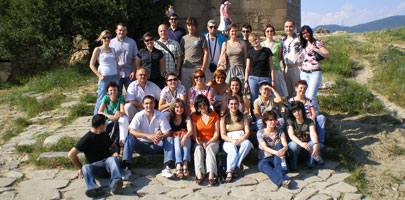 In March of 2009 Rising Voices granted funds to support another citizen media development project. The Rising Voices grantees family has now been joined by a non-profit organization based in the largest country in Central Asia. The new grantee, Public Fund “Mental Health,” is located in the city of Almaty, Kazakhstan. Their main work involves providing psychological support for HIV-positive people.
In March of 2009 Rising Voices granted funds to support another citizen media development project. The Rising Voices grantees family has now been joined by a non-profit organization based in the largest country in Central Asia. The new grantee, Public Fund “Mental Health,” is located in the city of Almaty, Kazakhstan. Their main work involves providing psychological support for HIV-positive people.
Public Fund “Mental Health,” which has members that are living with HIV, believes that there is a lack of communication between people living with HIV/AIDS and society. The Kazakhstan community of HIV-positive people is not well represented on the Internet, as community members don't have the basic skills and knowledge to work on the Web. This means that society doesn't have a chance to learn more about the issues that HIV-positive people face. Public Fund “Mental Health” will be using this grant money to try and eliminate this communication gap by teaching HIV-positive people to use Web-blogs to express their thoughts, needs, and ideas.
As part of this citizen media education program, the organization's staff and volunteers are going to train 50 HIV-positive people in Web-blogging and will help them develop Web pages so they can share their stories with the world. The “Mental Health” activists are also planing to publish a quarterly online bulletin that will cover the most significant issues people living with HIV/AIDS face in Kazakhstan. In addition, the Fund is planning to post stories of its trainees, including video and audio files, on its Web site.
The organization hopes that the skills obtained in using these new technologies will help HIV-positive people advocate for better quality medical service. The initiators of this project would also like to help the HIV-positive community in Kazakhstan establish connections with similar communities in other countries.
Until now, the biggest project that “Mental Health” has established is the Expert Center for Mental Health Assistance, formed in 2006 for people living with HIV/AIDS, their families, partners, and caregivers.
The members of Public Fund “Mental Health” explain why they think that those living with HIV/AIDS are especially in need of mental health assistance on their Web site:
The severity and complicity of diseases such as HIV/AIDS often leads to serious problems with the mental health of infected people, as well as their partners, families, friends. HIV infected people who suffer from depression, and drug and alcohol abuse are less likely to get tested but more likely to be involved in risky behavior…This tangle of interrelated issues deserves the highest attention, but often is ignored all over the world.
The organization's experts say that for high risk groups, mental health issues may occur at every stage of HIV detection:
Representatives of risk groups need psychological assistance while going through all these steps:
- Perturbed, waiting for results of HIV test
- The “I hate the entire world” feeling when the patient learns about his or her HIV status. This is the moment they become rude, excessively demanding…
- The patient accepts the idea of being HIV infected. During this period a person normally wants to stop drug consumption and take care of their health.
- The infected people break down into two groups: a smaller group of people live with hypochondriac symptoms and a larger group of patients ignore the fact that they are infected and continue to consume drugs on a regular basis.
To help HIV-positive people overcome mental health problems, the center implements public awareness programs focused on fighting stigma, trains caregivers (including counselors, social workers and activists from risk groups), and publishes health education literature.




2 comments
Welcome Public Fund “Mental Health”. Inspiring project.
Great to see the diversity and I hope to read a lot more about your progress!
Welcome.